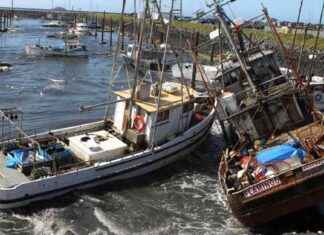He has been without cigarettes for decades. Now there should be no more steak? In his new adventure, Lucky Luke meets a convinced vegetarian who wants to educate an entire town to stop eating meat. Can that go well in the Wild West?
Jul’s daughter wants to be a vegetarian. And that’s not easy for the father. The comic author, whose real name is Julien Lucien Berjeaut, is French and grew up with meat. He doesn’t want to do without it, at least not completely. So what to do? Quite simply: Jul deals with the topic in the new adventure of Lucky Luke.
“Rantanplan’s Ark” is Volume 101 of the famous series. The drawings are now for the 14th time by Achdé, who once inherited Lucky Luke creator Morris. Because it is about animal welfare, the Berlin Egmont publishing house is also cooperating with the German Animal Welfare Association for this volume. That’s not surprising, since the series has always been populated by a number of animals, just think of Luke’s faithful horse Jolly Jumper.
In view of the subject, however, the volume has also become unusually political. Meat consumption and even more the renunciation of it irritate the mind, also in Germany. According to the Allensbach market and advertising medium analysis, there are currently 7.9 million people in Germany who describe themselves as vegetarians. There are also around 1.5 million vegans. In recent years, their number has steadily increased.
In addition, however, demands for meatless days in canteens in particular are causing discussions – and angry protests just because supposedly old habits are being called into question. The advantages for your own health, animal welfare and the environment are obvious. However, Jul was not about writing a politically correct comic, as he explained on Monday at the presentation of the book at the Belgian embassy in Berlin. Rather, he pokes fun at the stereotypes on both sides of the debate, exaggerating both meat eaters and vegetarians.
And of course the author doesn’t do without the typical “Lucky Luke” ingredients, puns and subtle allusions. This also includes a historical role model, because animal welfare already existed in the Wild West: the American Henry Bergh founded the first animal welfare association in the USA in 1866. It certainly wasn’t easy: Animal lives didn’t count for much back then, just think of the mass hunting of bison and the flourishing fur trade. The contemporary press was accordingly fond of caricatures about the animal rights activist. Later, Bergh traveled the length and breadth of the prairie, trying to get cowboys to better handle horses, cattle, and other animals.
One of these lectures inspired Ovide Byrde in “Rantanplan’s Arche”, who became a committed animal rights activist and vegetarian. In the western town of Cattle Gulch, however, this does not go down well – Lucky Luke can only just save Byrde from being hung up by angry citizens. But the animal lover is also lucky: of all things, the goofy dog ??Rantanplan, whom “Lucky Luke” fans know from countless other adventures and whom Byrde took in in need and nursed back to health, finds gold in a nearby coal mine. With this, Byrde can finally fulfill his dream of a large animal shelter and a foundation with which he wants to proselytize the citizens to vegetarianism.
But it is not quite so peaceful. Because others are also after the gold. They use Byrde’s love for animals to oppress Cattle Gulch. They want to force the residents to give up meat, and the city is renamed Veggie Town. What started out as well-intentioned animal rights activists turns into extremism as gunslingers like the Carott Kid, Quinoa Bob, and Strawberry Susan (who looks like actress and animal rights activist Brigitte Bardot) invade the city. “Vegetarians without mercy” they are called at one point. Then Lucky Luke has to intervene and take up arms – whereby not only Rantanplan, but also Jolly Jumper come under fire.
The moment when activism turns into fundamentalism is a highly topical issue given the much-criticized attacks on paintings and other actions by climate activists. Which actions are still covered by the noble goals, which are no longer? What if your own ideas are to be enforced with the threat of violence? The band still owes a clear answer to such questions. Jul compares his approach much more to a planetary system in which each celestial body represents a different perspective. “I want to depict all points of view so that the readers can orientate themselves in this cosmos,” he says.
Jul knows from his daughter that the conflicts between opinions also become visible along generational lines. In the comic, this is represented by a young Comanche who rejects the customs of his tribe – bison hunting and fur clothing. He becomes a vegetarian, instead of “Hungry Coyote” he calls himself “Nimble Leek”.
But somehow your own actions may influence others and bring about social change. That’s how it works with Jul. He doesn’t want to give up meat completely. But apparently his daughter has ensured that he is now ambivalent about meat consumption.
“Lucky Luke 101: Rantanplan’s Ark” will be available on Friday, November 4th as a hardcover in book stores and as a softcover in newsagents.






